
Pizzicato Five was a Japanese pop band formed in Tokyo in 1979 by multi-instrumentalists Yasuharu Konishi and Keitarō Takanami. After some personnel changes in the late 1980s, the band gained international fame as a duo consisting of Konishi and vocalist Maki Nomiya. With their music blending together 1960s pop, jazz and synth-pop, the group were a prominent component in the Shibuya-kei movement of the 1990s.

Çà et là du Japon is the thirteenth and final studio album by Japanese pop band Pizzicato Five. The album was released on January 1, 2001 by Readymade Records. Like many of the band's later albums, Çà et là du Japon is set in a famous city of the world during a specific time of the year, in this case Tokyo in winter. Çà et là du Japon differs from other Pizzicato Five albums in that it features several guest vocalists and songwriters, and lead vocalist Maki Nomiya appears on only a few of its songs.

Made in USA is a compilation album by Japanese pop band Pizzicato Five. The album was released in the United States on October 11, 1994 by Matador Records, serving as the band's first full-length, and second overall, American release on the label. Along with the Five by Five EP released earlier in 1994, it introduced Pizzicato Five to a Western audience.

The Sound of Music by Pizzicato Five is a compilation album by Japanese pop band Pizzicato Five. The album was released in the United States on October 31, 1995 by Matador Records, serving as the band's second full-length, and third overall, American release on the label. Following Made in USA, The Sound of Music by Pizzicato Five is Matador's second compilation of Pizzicato Five's previously released material.

Sweet Pizzicato Five (スウィート・ピチカート・ファイヴ) is the sixth studio album by Japanese pop band Pizzicato Five. It was released on September 21, 1992 by the Nippon Columbia imprint Triad. The album marks a turn toward a more house music-influenced sound for the band.
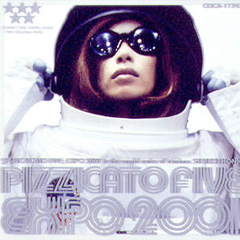
Expo 2001 is a remix album by Japanese pop band Pizzicato Five. It was released on November 1, 1993 by the Nippon Columbia imprint Triad.

Happy End of You is a remix album by Japanese pop band Pizzicato Five. The album was released on May 5, 1998 by Matador Records. It consists of remixes of songs from the band's album Happy End of the World, with the exception of "Contact", which originally appeared on Romantique 96.

Instant Replay (インスタント・リプレイ) is a live album by Japanese pop band Pizzicato Five. It was released on March 21, 1993 by the Nippon Columbia imprint Triad. The album was reissued by Readymade Records on March 31, 2006.

Nonstop to Tokyo (ノンストップ・トゥ・トーキョー) is an EP by Japanese pop band Pizzicato Five, released on July 17, 1999 by Readymade Records.

Darlin' of Discothèque (ダーリン・オブ・ディスコティック) is an EP by Japanese pop band Pizzicato Five, released on April 21, 1999 by Readymade Records.

Voyage à Tokyo (東京の合唱) is an EP by Japanese pop band Pizzicato Five, released on September 27, 2000 by Readymade Records.

24 Decembre (12月24日) is an EP by Japanese pop band Pizzicato Five, released on November 22, 2000 by Readymade Records.
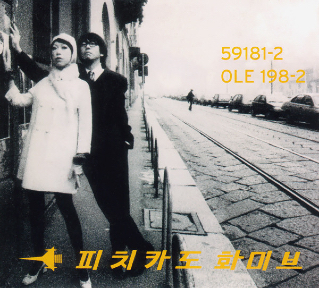
Happy End of the World (ハッピー・エンド・オブ・ザ・ワールド) is the tenth studio album by Japanese pop band Pizzicato Five. The album was released on June 21, 1997, by Readymade Records. In the United States, it was released by Matador Records on September 9, 1997, and peaked at number 32 on Billboard's Heatseekers Albums chart. A companion remix album, Happy End of You, was released in 1998. Happy End of the World was reissued by Readymade on March 31, 2006.

Overdose (オーヴァードーズ) is the eighth studio album by Japanese pop band Pizzicato Five. The album was released on October 1, 1994 by the Nippon Columbia imprint Triad. It is their first studio album not to feature founding member Keitarō Takanami, who departed the band earlier in the year. Overdose is the first of several Pizzicato Five albums to be themed around a famous city, in this case New York. The album pays tribute to soul music, and soul singer Stevie Wonder in particular, with several songs incorporating Wonder's signature instrument, the harmonica.
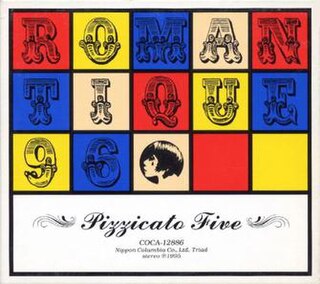
Romantique 96 (ロマンティーク96) is the ninth studio album by Japanese pop band Pizzicato Five. It was released on September 30, 1995 by the Nippon Columbia imprint Triad. The album is highly inspired by 1960s French cinema and music. It was reissued by Readymade Records on September 30, 2000 and March 31, 2006.
The discography of Japanese Shibuya-kei group Pizzicato Five includes 13 studio albums, one live album, one soundtrack album, 16 compilation albums, nine remix albums, six video albums, 13 extended plays and 22 singles.
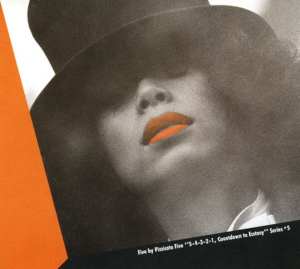
This Year's Girl (女性上位時代) is the fifth studio album by Japanese pop band Pizzicato Five. It was released on September 1, 1991 by the Nippon Columbia imprint Seven Gods, serving as the band's first album for Nippon Columbia. This Year's Girl is the first Pizzicato Five album to feature Maki Nomiya as lead vocalist. On the album, the band augmented their Shibuya-kei sound with elements of alternative dance and began to more fully incorporate sampling into their music.

Couples (カップルズ) is the debut studio album by Japanese pop band Pizzicato Five. The album was released on April 1, 1987 by CBS/Sony.

Pizzicato Five is the twelfth studio album by Japanese pop band Pizzicato Five. The album was released on November 20, 1999 by Readymade Records. Under the title The Fifth Release from Matador, it was released in the United States on November 14, 2000 by Matador Records. Pizzicato Five was reissued on March 31, 2006.
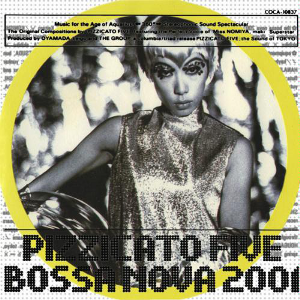
Bossa Nova 2001 (ボサ・ノヴァ2001) is the seventh studio album by Japanese pop band Pizzicato Five. It was released on June 1, 1993 by the Nippon Columbia imprint Triad. The band co-produced the album with acquaintance and fellow Shibuya-kei artist Cornelius. Following the house music-oriented Sweet Pizzicato Five the previous year, Bossa Nova 2001 signaled a return to the band's 1960s and 1970s-influenced pop style, mixed with elements of alternative dance.



















